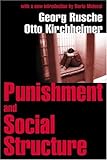The name Otto Kirchheimer is reasonably well known in the fields of penology and political theory, but is not, I suspect, well known to criminal lawyers. A member of the Frankfurt School of critical theory, he left Germany (along with other members of that school) in the 1930s to escape Nazi persecution. He then worked at a number of US universities, though never becoming as well known as contemporaries such as Herbert Marcuse.
In penology his reputation is founded on his seminal work (with Georg Rusche) on Punishment and Social Structure (1939) which developed a marxist interpretation of the history of the prison in terms of its relation to the labour market. They argued that prison population increased at times of economic crisis as a means of controlling labour (the unemployed), and that prisons were a means of training and extracting value from the lumpenproletariat through forced labour. In the field of political theory he is best known for his work Political Justice (1961), which looks at the use of trials for political ends - in particular the show trials of the Soviet Union. This is a book that has recently been attracting renewed, if specialised scholarly interest with the revival of interest in the trials of the perpetrators of atrocities and theories of the criminal trial.
Given this background, it is then perhaps something of a surprise to come across his name in the Harvard Law Review of 1942 writing on the topic of omissions. Not only that but the article begins very much like a conventional law review article with a scholarly discussion of the historical sources of liability for omissions in Roman law and the theological writings of St Thomas Aquinas, before moving into discussion of causation and omissions. But the real treat of the article is that it combines discussion of the legal sources with an awareness of the changes in political institutions and social beliefs that have shaped the scope of the law of omissions. Thus, instead of the kind of discussion normally found in legal journals which sees the problems of omissions liability as an intellectual puzzle or problem of moral philosophy, Kirchheimer demonstrates how changes in the liability of parents for the neglect of their children are linked to the English poor laws and their reforms, or how the abstract examples loved by moral philsophers fail to relate to the acutal cases in which situations of omission liability arise. In all these cases Kirchheimer shows an awareness of, and sensitivity to, different kinds of social relationships and the social context in which activities take place. What emerges then is a sophisticated and rich comparative and historical discussion of the problem which, if lacking the overt Marxist themes of his other works, demonstrates how legal analysis can be linked to social questions.
What is more Kirchheimer has the rare distinction, especially for jurists and political theorists, of having a street named in his honour (in Bockingen). But it is a distinction that seems peculiarly merited.
On his death his papers were left to the library at SUNY at Albany. These, and further biographical details, can be found here: http://library.albany.edu/speccoll/findaids/ger006.htm
This is a blog about the history, theory and practice of the criminal law. I shall write about books, cases, trials, novels that catch my interest, and even occasionally about current events. My aim is not comment on current caselaw or issues in criminal justice, but to rather to develop a more oblique critique of the law.
Oblique intent
Why the name? Well criminal law afficionados will recognise the phrase 'oblique intent' as referring to a problem of mens rea:can a person who intends to do x (such as setting fire to a building to scare the occupants) also be said to have an intention to kill if one of the occupants dies? This is a problem that has consumed an inordinate amount of time in the appeal courts and in the legal journals, and can be taken to represent a certain kind of approach to legal theory. My approach is intended to be more oblique to this mainstream approach, and thus to raise different kinds of questions and issues. Hence the name.


No comments:
Post a Comment